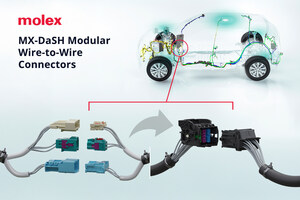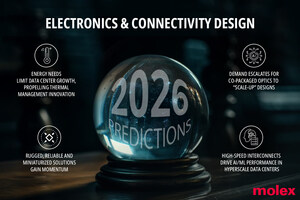
- Actionable data insights ignite major innovations in automotive, consumer devices, data centers and connected healthcare applications
- Artificial intelligence, AR/VR, digital twins, sensors and machine learning enriched by proliferation of new data sources
- Increased investments in edge computing and Industry 4.0 platforms needed to alleviate the strain of data-driven applications on IT infrastructures
LISLE, Ill., Nov. 16, 2022 /PRNewswire/ -- Molex, a global electronics leader and connectivity innovator, today offered its 2023 industry predictions fueled by the increased investment in applications using real-time data to propel major advancements across automotive, consumer devices, data center and connected healthcare markets. The emergence of powerful applications, such as artificial intelligence, AR/VR, digital twins, sensors and machine learning, benefit from connected data to deliver unprecedented customer value, starting with product design and ideation and extending to supply chain intelligence, advanced manufacturing and fulfillment.
"The collection of rich data has produced initial waves of highly-intelligent, specific applications that are transforming entire industry segments while creating a glut of information that causes bandwidth and latency issues," said Lily Yeung, VP at Molex Ventures. "As more applications for AI, AR/VR and IoT sensors emerge, we expect pressure for faster cloud-computing speeds and edge-computing solutions that move data processing and computational storage closer to the edge of high-speed networks. Additionally, we see a continued push for 5G, diagnostic wearables and electrification, which will contribute to ever-increasing amounts of data that must be collected, calibrated and shared across a multitude of smart devices and platforms."
Molex also forecasts a rise in cross-functional data collection to support integrated demand planning and end-to-end supply chain visibility across the electronics ecosystem. Integrated risk insights will boost logistics visibility, recovery and transportation while digital twins will play a major role in improving supply chain visibility, agility and performance. These trends, among others, will accelerate the pace of market-specific innovations in 2023, including:
Automotive applications put data front-and-center
- Advanced Driver-Assistance Systems (ADAS) will depend on data from a constellation of sensors, from cameras and LIDAR systems to AI applications that analyze data, identify road hazards and present information in intuitive, integrated displays.
- Automakers will make prescriptive moves to enable Level 2 and Level 3 Autonomy. Interest and investment will be concentrated on mass-market adoption of Level 2 and Level 3 Autonomy.
- Major investments in battery management, zonal architectures and EV charging stations will dominate. Emerging demand for Infrastructure advancements is expected to escalate over the next 12-to-18 months, which also will place greater emphasis on the need for intelligent sensors and high-speed connectors.
Industrial metaverse will impact development of consumer devices and IIoT solutions
- AR/VR will leverage early success in the industrial sector, giving consumers a hint of what's to come. It won't be mainstream for five more years, but new offerings from Apple, Meta and others will illuminate the vision of what the near future will hold.
- Investments in Industrial IoT will grow, thanks to strong use cases in industrial settings. IoT in factory and other industrial settings – such as robotics and AI—will see a surge in usage, as businesses roll out investments made over the last few years.
- Supply chains for consumer devices will diversify to keep pace with market dynamics. Supply chains for mobile devices will continue to expand away from China, and will accelerate, resulting in incremental investment from major U.S. and even Chinese device-makers into India.
Data center investments will continue to focus on processing speed and capacity
- An insatiable appetite for computational processing speed and storage capacity continues. The explosion of IoT and applications for consumer and business sectors will create a major macro trend for more robust compute and storage capabilities.
- Edge computing will grab the largest share of investments. The migration toward Extended Reality (XR) will move data processing to the edge, allowing inferencing to happen more in real time to match performance expectations.
Demand for personalized/customized healthcare solutions will dominate
- Continued blurring of consumer vs. regulated products creates challenges. Providers of wearable diagnostics and the use of tracking applications for fitness, mental health and other applications must navigate the regulatory environment, which requires specialized expertise.
- Data privacy and security remain top priorities. Remote patient monitoring is becoming less about connectivity and more about actionable real-time information analysis, especially amid persistent privacy and security sensitivities.
- Mental-health diagnostic applications emerge. Post-Covid emphasis on well-being has opened the door wider for mental health diagnostic solutions.
Molex is a global electronics leader committed to making the world a better, more-connected place. With presence in more than 40 countries, Molex enables transformative technology innovation in the automotive, data center, industrial automation, healthcare, 5G, cloud and consumer device industries. Through trusted customer and industry relationships, unrivaled engineering expertise, and product quality and reliability, Molex realizes the infinite potential of Creating Connections for Life. For more information, visit www.molex.com.
SOURCE Molex Incorporated







Share this article